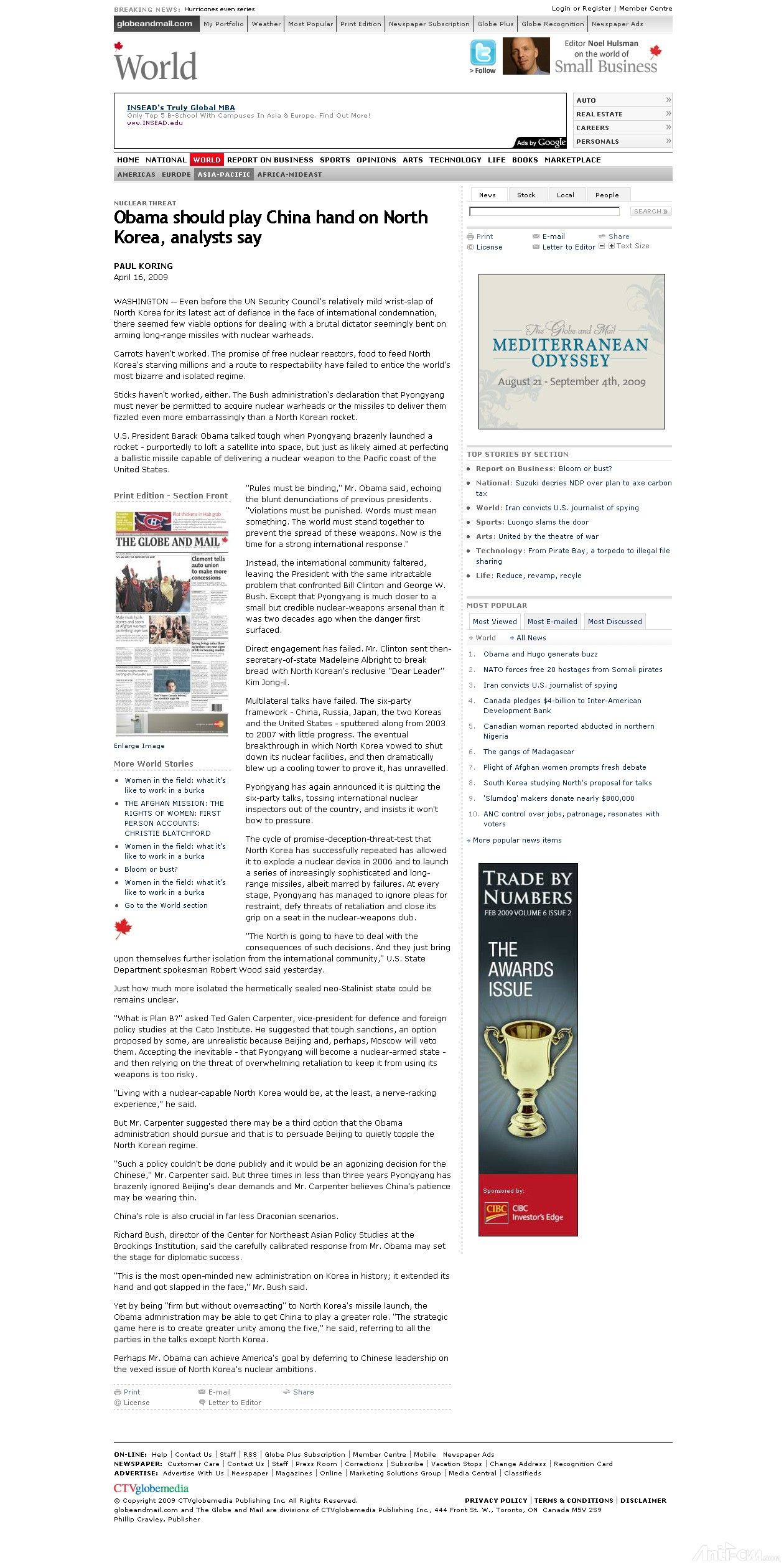|
|
本帖最后由 I'm_zhcn 于 2009-4-20 00:21 编辑
Obama should play China hand on North Korea, analysts say
http://www.theglobeandmail.com/servlet/story/LAC.20090416.KOREA16ART22240/TPStory/TPInternational/Asia/
PAUL KORING April 16, 2009
[size=100%]WASHINGTON -- Even before the UN Security Council's relatively mild wrist-slap of North Korea for its latest act of defiance in the face of international condemnation, there seemed few viable options for dealing with a brutal dictator seemingly bent on arming long-range missiles with nuclear warheads.
[size=100%]
Carrots haven't worked. The promise of free nuclear reactors, food to feed North Korea's starving millions and a route to respectability have failed to entice the world's most bizarre and isolated regime.
Sticks haven't worked, either. The Bush administration's declaration that Pyongyang must never be permitted to acquire nuclear warheads or the missiles to deliver them fizzled even more embarrassingly than a North Korean rocket.
U.S. President Barack Obama talked tough when Pyongyang brazenly launched a rocket - purportedly to loft a satellite into space, but just as likely aimed at perfecting a ballistic missile capable of delivering a nuclear weapon to the Pacific coast of the United States.
"Rules must be binding," Mr. Obama said, echoing the blunt denunciations of previous presidents. "Violations must be punished. Words must mean something. The world must stand together to prevent the spread of these weapons. Now is the time for a strong international response."
Instead, the international community faltered, leaving the President with the same intractable problem that confronted Bill Clinton and George W. Bush. Except that Pyongyang is much closer to a small but credible nuclear-weapons arsenal than it was two decades ago when the danger first surfaced.
Direct engagement has failed. Mr. Clinton sent then-secretary-of-state Madeleine Albright to break bread with North Korean's reclusive "Dear Leader" Kim Jong-il.
Multilateral talks have failed. The six-party framework - China, Russia, Japan, the two Koreas and the United States - sputtered along from 2003 to 2007 with little progress. The eventual breakthrough in which North Korea vowed to shut down its nuclear facilities, and then dramatically blew up a cooling tower to prove it, has unravelled.
Pyongyang has again announced it is quitting the six-party talks, tossing international nuclear inspectors out of the country, and insists it won't bow to pressure.
The cycle of promise-deception-threat-test that North Korea has successfully repeated has allowed it to explode a nuclear device in 2006 and to launch a series of increasingly sophisticated and long-range missiles, albeit marred by failures. At every stage, Pyongyang has managed to ignore pleas for restraint, defy threats of retaliation and close its grip on a seat in the nuclear-weapons club.
"The North is going to have to deal with the consequences of such decisions. And they just bring upon themselves further isolation from the international community," U.S. State Department spokesman Robert Wood said yesterday.
Just how much more isolated the hermetically sealed neo-Stalinist state could be remains unclear.
"What is Plan B?" asked Ted Galen Carpenter, vice-president for defence and foreign policy studies at the Cato Institute. He suggested that tough sanctions, an option proposed by some, are unrealistic because Beijing and, perhaps, Moscow will veto them. Accepting the inevitable - that Pyongyang will become a nuclear-armed state - and then relying on the threat of overwhelming retaliation to keep it from using its weapons is too risky.
"Living with a nuclear-capable North Korea would be, at the least, a nerve-racking experience," he said.
But Mr. Carpenter suggested there may be a third option that the Obama administration should pursue and that is to persuade Beijing to quietly topple the North Korean regime.
"Such a policy couldn't be done publicly and it would be an agonizing decision for the Chinese," Mr. Carpenter said. But three times in less than three years Pyongyang has brazenly ignored Beijing's clear demands and Mr. Carpenter believes China's patience may be wearing thin.
China's role is also crucial in far less Draconian scenarios.
Richard Bush, director of the Center for Northeast Asian Policy Studies at the Brookings Institution, said the carefully calibrated response from Mr. Obama may set the stage for diplomatic success.
"This is the most open-minded new administration on Korea in history; it extended its hand and got slapped in the face," Mr. Bush said.
Yet by being "firm but without overreacting" to North Korea's missile launch, the Obama administration may be able to get China to play a greater role. "The strategic game here is to create greater unity among the five," he said, referring to all the parties in the talks except North Korea.
Perhaps Mr. Obama can achieve America's goal by deferring to Chinese leadership on the vexed issue of North Korea's nuclear ambitions.

|
analysts, hand, Korea, North, Obama, analysts, hand, Korea, North, Obama, analysts, hand, Korea, North, Obama
评分
-
1
查看全部评分
-
|